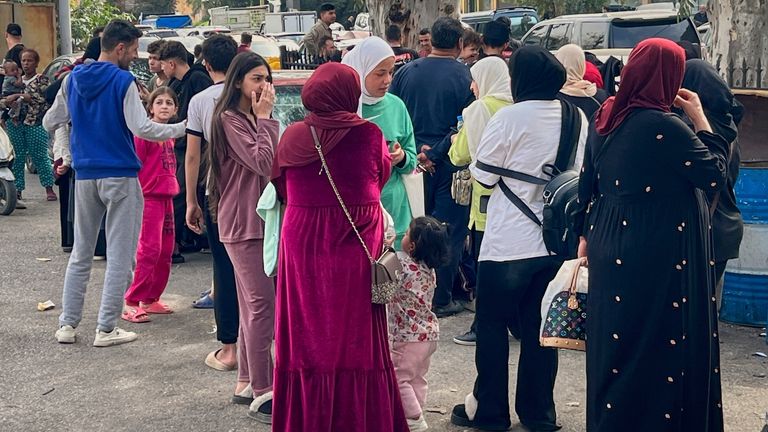Israel has carried out a strike on Beirut for the first time since it agreed a ceasefire deal with Hezbollah in November.
The Israeli military says the strike targeted a Hezbollah drone storage facility in Dahiyeh, in the city’s southern suburbs, which it called a key Hezbollah stronghold and where support for the militant group is strong.
It comes after Israel’s army used a post on X in Arabic to urgently warn people to evacuate parts of a Beirut suburb on Friday as it vowed to retaliate against strikes that it said were launched from Lebanon into northern Israel.
Lebanon’s government ordered all schools and universities in Beirut’s southern suburb of Hadath to close for the day.
Shooting could be heard in some parts of the southern suburbs, warning people to leave their homes, and many residents were seen fleeing the area in cars and on foot.
Associated Press reporters in Beirut said they heard a large boom and saw smoke rising from where Israel’s military had said it would strike, a residential and commercial area containing at least two schools.
Though it’s the first Israeli strike on Beirut since November’s ceasefire with the Hezbollah militant group, Israel has struck targets in southern Lebanon almost daily since then.
Hezbollah began launching rockets, drones, and missiles into Israel the day after Hamas’s 7 October 2023 attack on southern Israel.
In September, Israel carried out waves of airstrikes and killed most of Hezbollah’s senior leaders as the bubbling conflict became an all-out war.
More than 4,000 people in Lebanon died, while around 60,000 Israelis were displaced.
Under the ceasefire that halted the fighting, Israeli forces were supposed to withdraw from all Lebanese territory by late January.
The deadline was extended to February 18, but Israel has remained in five locations in Lebanon across from communities in northern Israel.
Meanwhile, Israel has carried out dozens of airstrikes on southern and eastern Lebanon, saying it attacked Hezbollah, while continuing drone attacks that have killed several members of the militant group.
Six people died in Israeli airstrikes on several locations in Lebanon last week.
The UN special co-ordinator for Lebanon, Jeanine Hennis-Plasschaert, said the exchange of fire was deeply concerning, calling it a “critical period for Lebanon and the wider region”.
According to an Israeli official who was not authorised to speak to the media, Israeli Prime Minister Benjamin Netanyahu was meeting top security officials to discuss an impending strike on the capital.
The escalation came as Israel ended its ceasefire with Hamas by launching a surprise wave of strikes that killed hundreds of people in Gaza.
Read more:
Oscar winner ‘detained and beaten up’
What happened to Israel-Hamas ceasefire?
Earlier this month, Israel halted deliveries of food, fuel, medicine, and humanitarian aid to Gaza’s roughly two million Palestinians.
Israel has vowed to escalate the war until Hamas returns 59 hostages it still holds – 24 of them believed to be alive. Israel is demanding that the group give up power, disarm, and send its leaders into exile.
Hamas has said it will release the remaining captives only in exchange for Palestinian prisoners, a lasting ceasefire, and an Israeli withdrawal from Gaza.
This breaking news story is being updated and more details will be published shortly.
Please refresh the page for the fullest version.
You can receive breaking news alerts on a smartphone or tablet via the Sky News app. You can also follow us on WhatsApp and subscribe to our YouTube channel to keep up with the latest news.
This story originally appeared on Skynews



